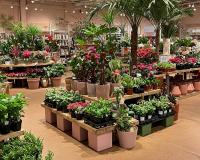India’s Indoor Plant Market Booms, But Buyers Face Challenges

Nitin Sindhu VY | Mumbai
The Green Revolution: How Indoor Plants Became a National Obsession
Across urban India, a quiet revolution is taking root—literally. Homes, offices, and even small apartments are increasingly adorned with lush greenery as millions embrace indoor gardening. According to market data, India's indoor plant sector was valued at a staggering $ 250.41 million in 2024, with projections indicating it could blossom to $ 405.66 million by 2030—an annual growth rate of 8.45%.
The global picture is even more impressive. The online plant nursery market, worth $ 12.83 billion in 2024, is expected to skyrocket to $ 36.01 billion by 2033, growing at 12.15% annually.
This explosive growth is fueled by several factors:
- Health Consciousness: Plants like snake plants, peace lilies, and spider plants are nature's air purifiers, removing toxins and boosting oxygen levels.
- Urbanization: As cities expand, green spaces shrink, driving people to create personal oases indoors.
- Aesthetic Appeal: Instagram-worthy "plant corners" and balcony gardens have become status symbols.
-Gifting Culture: Plants have replaced traditional gifts for birthdays, housewarmings, and even corporate events.
Major players like NurseryLive, Ugaoo, Urvann, PlantsGuru, and Plantogallery dominate the market, offering everything from rare succulents to statement fiddle-leaf figs.
🔸A Thorny Issue: Widespread Dissatisfaction Among Plant Buyers
However, behind this flourishing industry lies a troubling trend—widespread customer dissatisfaction.
Deepa Deshpande, a Mumbai-based marketing executive, shares her experience: "I ordered a beautiful flowering adenium online. The product photo showed vibrant pink blooms, but what arrived was a wilted stem with yellowing leaves. It died within a week despite my care."
Her story is far from unique. Common complaints include:
1. Deceptive Marketing:
- Stock images used instead of actual plant photos
- Exaggerated claims about plant size or flowering status
2. Logistical Nightmares:
- Plants arriving dehydrated or damaged due to poor packaging
- No protective measures for extreme weather during transit
3. Lack of Aftercare Support:
- Missing or vague care instructions
- No guidance for common issues like pests or leaf drop
Online forums and review sections are flooded with similar grievances, particularly about flowering plants and delicate species like orchids.
🔸Root Causes: Why the System is Failing
Industry insiders point to several systemic issues:
- Supply Chain Gaps : Most online sellers source from third-party nurseries with inconsistent quality standards.
- Profit Over Health: The rush to meet demand leads to premature harvesting and inadequate hardening of plants.
- Knowledge Gap: Many new sellers lack horticultural expertise, unable to advise customers properly.
Rajesh Verma, owner of a Delhi-based nursery, explains: "Young plants need weeks to acclimatize before shipping. But today, seedlings are often uprooted and dispatched the same day to fulfill orders."
🔸Cultivating Change: Solutions for a Healthier Industry
Experts suggest multi-pronged solutions:
For Sellers:
✅ Implement strict quality audits at nurseries before procurement
✅ Invest in climate-controlled packaging (hydrating gels, breathable wraps)
✅ Provide real plant photos with date stamps instead of stock images
✅ Offer video consultations with horticulturists post-purchase
For Buyers:
✔ Research sellers thoroughly—check reviews and return policies
✔ Start with hardy varieties (ZZ plants, pothos) before delicate species
✔ Consider local nurseries for high-value purchases to inspect plants firsthand
Innovations like self-watering pots, smart plant sensors, and subscription-based care services are also gaining traction, helping "plant parents" manage their green babies better.
🔸The Road Ahead: Can India’s Plant Market Blossom Sustainably?
The potential is undeniable. With remote work continuing, millennials investing in wellness, and sustainability becoming a priority, demand will only grow. However, the industry stands at a crossroads—will it prioritize short-term profits or long-term trust-building?
As Neha Patel, a Bengaluru-based landscape architect, puts it: "Plants aren’t just decor—they’re living things. Sellers must treat them that way, and buyers need to educate themselves too. Only then can this green wave truly thrive."
About The Author


.jpeg)

.svg.png)
.jpeg)
.jpeg)


.jpeg)
.svg.png)
.jpeg)
